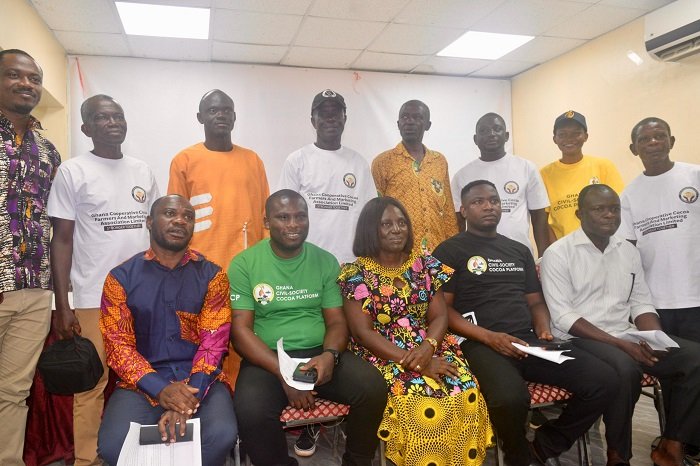News
GCCP Slams Government’s 2025/26 Cocoa Price as Misleading, Calls for 70 percent of World Market Rate

The Ghana Civil-Society Cocoa Platform (GCCP) has criticised the government’s newly announced cocoa producer price for the 2025/2026 crop season, describing it as misleading and inadequate in addressing the worsening economic conditions confronting cocoa farmers.
According to the group, the reported 62 percent increase in the farm gate price from USD $3,100 to USD $5,040 per metric tonne does not reflect the real benefit to farmers. In local currency terms, they argue, the actual increase is only about 4.1 percent.
Speaking at a press conference in Accra on Tuesday, President of the GCCP, Issaka Issifu, explained that although the dollar figures may appear significant, the price per 64-kilogram bag has risen only marginally from GH¢3,100 to GH¢3,228.75.
He described the increase as inadequate, especially in light of the economic hardships cocoa farmers are facing such as rising costs of inputs, labour, and basic living expenses and noted that President John Dramani Mahama had publicly pledged that farmers would receive 70 percent of the world market price.
The GCCP believes this created the expectation that the farm gate price would be calculated directly from the gross global price of cocoa, not after deducting processing and export costs.
However, Mr Issifu stated that the recent announcement by the Minister for Finance was based on the Free on Board (FOB) price a lower benchmark which reflects the value of cocoa after deductions such as transport, port handling, and quality control have been made. The group said this contradicts the earlier political commitment and has generated confusion among farmers.
Citing its own technical calculations, he revealed that with the world market price averaging about $8,298 per metric tonne, 70 percent of that would amount to roughly GH¢58,835 per tonne. When converted and divided by 16 bags per tonne (64kg per bag), this would translate to approximately GH¢3,677 per bag.
Given that expectation, the Platform is calling on government to honour its original commitment to pay 70 percent of the world market price without deductions, which would amount to at least GH¢3,600 per bag. They are also urging mid-season price reviews to reflect market fluctuations, stronger support for local Licensed Buying Companies (LBCs), and long-term investments in infrastructure, climate resilience, and farmer education.
Mr Issifu also raised concerns about persistent structural challenges affecting the cocoa sector, such as limited access to agricultural inputs, weak extension services, climate vulnerabilities, and poor infrastructure in cocoa-growing communities. They warned that low pricing is fueling the smuggling of cocoa beans to neighbouring countries where farmers are paid significantly higher rates.
While acknowledging government’s reintroduction of input support programmes, he cautioned against political interference in their implementation, citing past experiences of favouritism and partisan distribution. he also welcomed the upcoming Ghana Cocoa Traceability System aimed at ensuring compliance with the European Union’s deforestation regulations, but said many farmers remain uninformed and unprepared for its rollout.
The GCCP reaffirmed its commitment to advocating for cocoa farmers’ welfare and said it is prepared to work with government and other stakeholders to build a fairer and more sustainable cocoa industry in Ghana.
BY STEPHANIE BIRIKORANG
Hot!
Is the “Rev” title biblical?

In many Ghanaian churches, pastors are often introduced as “Reverend” or simply “Rev.”
The title is seen as a mark of respect, yet its biblical basis continues to stir debate.
While some Christians argue that it is a harmless way to honour church leaders, others insist it is unbiblical and should not be used at all.
Those who question the title usually point to the Bible itself. Nowhere in Scripture did Jesus or the apostles use “Reverend” for themselves or for one another.
Instead, they addressed each other as “brother” or “servant.” In Matthew 23, Jesus even warned his followers not to seek titles such as “rabbi” or “father,” teaching that all believers are equal under one God.
Critics also note that Psalm 111:9 describes God’s name alone as “holy and reverend” in the King James Bible.
To them, this means the word should be reserved for God, not for human beings. Others go further, citing Job 32, which cautions against giving flattering titles to men.
For such voices, the modern use of “Reverend” risks elevating pastors beyond what the Bible prescribes.
On the other hand, defenders of the title argue that it is not meant to replace God’s reverence but simply to acknowledge a minister’s role.
In many churches, “Reverend” is given to ordained ministers who have undergone training, much like the way a doctor is addressed as “Dr.”
The Bible itself, they point out, encourages believers to honour their leaders, with 1 Timothy 5:17 stating that elders who direct the affairs of the church well are “worthy of double honour.”
In this sense, the title is seen as a formal courtesy rather than a theological statement.
Supporters remind critics that Christianity does not operate in a vacuum but within cultural settings.
In Ghanaian society, respect for elders and authority is central to social order. Just as chiefs are addressed with titles such as “Nana” or “Togbe,” many Christians believe it is fitting to extend a similar courtesy to church leaders.
In their view, calling a pastor “Reverend” reflects Ghanaian values of honour and respect, and does not amount to worshipping a human being.
Yet the debate is far from settled. Some argue that the title has been abused, with individuals presenting themselves as “Reverend” without any proper training or accountability.
Calls have even been made for the regulation of church titles to prevent confusion and protect the credibility of ministry. Others, however, see no harm in its continued use, so long as it is not taken beyond what Scripture allows.
At the heart of the matter lies a bigger question: should Christians stick strictly to biblical language when addressing their leaders, or is it acceptable to adapt titles as society evolves?
The conversation is not just theological but cultural, touching on how Ghana balances respect for tradition with the authority of Scripture.
The debate over the “Rev” title is therefore not one with easy answers. What is clear, however, is that it forces us to reflect on how we show honour, how we interpret the Bible, and how faith interacts with our cultural practices.
As the discussion continues in church pews and on social platforms, we ask you: should pastors and ministers be called “Reverend,” or should Christians abandon the title altogether?
By: Jacob Aggrey
News
Brigadier General Michael Opoku not under arrest – GAF confirms

The Ghana Armed Forces (GAF) has denied reports claiming that Brigadier General Michael Opoku has been arrested by security operatives for possessing ammunition.
In a statement issued on Tuesday, August 19, 2025, and signed by Captain V.A. Arhin, Acting Director General of Public Relations, GAF said enquiries from various security agencies and national investigation authorities had not confirmed the alleged arrest.
The statement explained that Brigadier General Michael Opoku remains an active member of the Ghana Armed Forces and is not under arrest for any crime.
GAF further assured the public that any military officer found to have committed a crime would face the same legal procedures as any other citizen.
It added that the report of his arrest was false and should be ignored, urging the public to desist from spreading misinformation and disinformation.
By: Jacob Aggrey






